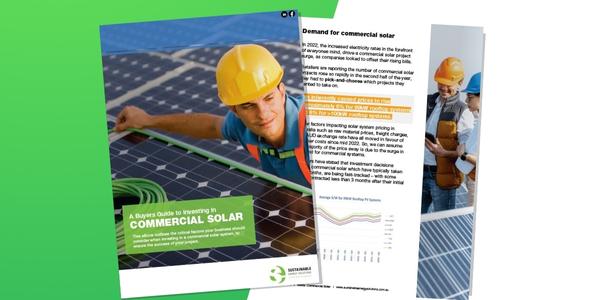8 Key Points from our Solar Webinar
If you missed our recent webinar - Your Guide to Buying Commercial Solar, don’t worry. Our presenters have put together a short recap covering the important discussion points.
1. Now is a great time to invest in a solar system to reduce your business’s exposure to the grid.
When analysing the energy market, we continue to see high electricity costs and volatility. Solar electricity is close to free if it’s a capex project and is the best way to achieve real emission reductions. Rebates are still high but declining (eg. STC, LGC & VEEC).
2. Tackle your solar project in the right order – solution first.
Before you start the process of getting quotes from suppliers, clearly define the scope of your project and ensure your site is suitable for the a system size that meets your energy needs now, and in the future.
3. Choose a solution that balances your business needs.
When choosing your system size and specifications, it’s important to maximise your emission reduction, energy cost savings, grants/rebates/tax incentives and finance options. You will want to minimise your implementation costs, disruption to site and project timeline.
4. Unsure where to begin - start with a Desktop Solar Assessment.
Engage independent experts to help you define the solution that best meets your needs. SES can organise a Desktop Solar Assessment quickly and accurately. The report includes automated roof solar sizing, detailed energy charges and tariffs, predicted energy profile, solar, battery and PFC assessment. This information is provided in a PDF report to help you build your business case.
5. For large scale projects above 300 kWs – we recommend an SES Solar Feasibility Assessment.
This expert assessment goes into a lot more detail including the following: site electrical inspection and feasibility, connections points, cabling, roof area inspection, structural roof assessment (checking weight/wind handling) and feasibility report with financial modelling.
6. How to compare suppliers and quotes?
We recommend that you compare offers from at least 3 suppliers. When comparing suppliers assess their experience, financial stability, quality of work and customer reviews. When comparing quotes, ensure you have clearly defined standardised inclusions and exclusions, so you are comparing apples with apples.
7. Ensure your contract covers what it should
A good solar contract will include protections such as a defect liability clause, performance guarantees (requiring ongoing performance tracking). It should also outline a clear project timeline, detailing your project schedule, milestones, practical completion date and liquidated damages (to ensure your project runs on time). We recommend your contract lists your inclusions, has minimal exclusions and there is no room for variations.
8. Upon practical completion of your project - conduct an Owner’s Engineer Audit
Once your project is completed and your solar is in place, have an independent party conduct a system audit to check for defects and to ensure the system is running correctly. It’s also a good idea to have performance alerts set-up so you are notified early if there’s an issue with the system’s performance.
Looking to invest in commercial solar?
Discuss your solar needs today with our team by filling out the form above or calling us on (02) 9371 4153.
>> Download our FREE eBook ’A Buyers Guide to investing in Commercial Solar'


